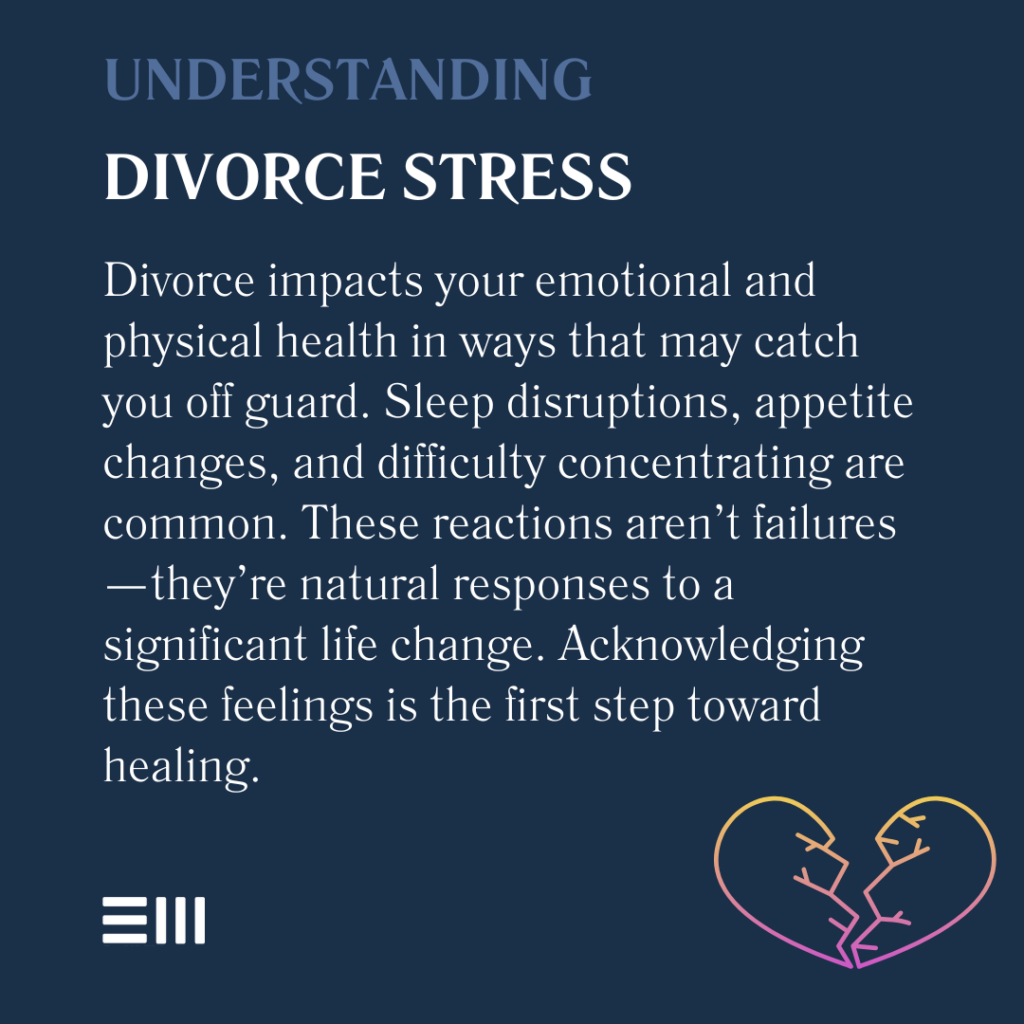
The kitchen feels empty without the morning coffee routine you shared for years. The silence in the evening weighs heavy where laughter once filled the room.
Divorce doesn’t just reshape your future—it transforms your daily reality. While these changes may feel overwhelming now, you have more power than you realize to navigate this transition with strength and resilience.
Understanding Divorce Stress
Divorce stress affects both your emotional and physical well-being in ways that can catch you off guard. Your body and mind are processing a significant life change, and recognizing these reactions as normal can help you better address them.
Common manifestations of divorce stress include:
- Sleep disruptions that leave you exhausted yet unable to rest at night;
- Changes in appetite that swing between comfort eating and lost interest in food;
- Difficulty concentrating at work or remembering daily tasks;
- Physical symptoms like headaches, muscle tension, and digestive issues;
- Overwhelming emotions that surface at unexpected moments; and
- Social withdrawal and loss of interest in previously enjoyed activities.
Understanding these responses as natural parts of the healing process helps create a foundation for moving forward.
Remember that experiencing these symptoms doesn’t mean you’re handling divorce poorly—it means you’re human.

Tip #1: Build Your Support Network
Creating a strong support system marks one of the most crucial steps in managing divorce stress. Think of your support network as scaffolding that helps hold you up while you rebuild your life’s structure.
Consider including these key supporters:
- A trusted therapist or counselor who specializes in divorce recovery;
- Close friends who can listen without judgment;
- Family members who respect your boundaries and choices;
- Support groups where you can connect with others sharing similar experiences;
- Colleagues who understand your need for flexibility; and
- Professional advisors like attorneys or financial planners who provide practical guidance.
Building this network takes time and intentional effort, but each connection strengthens your foundation for healing. Don’t hesitate to lean on these supports—they represent strength, not weakness.
Tip #2: Establish New Routines
Creating new daily patterns helps anchor you during this time of change. Consider this process as designing a life that fits who you are becoming, not just filling the spaces left behind.
Essential elements of a healthy routine include:
- Regular sleep and wake times that prioritize rest;
- Scheduled meals that nourish your body and mind;
- Dedicated work hours that maintain professional stability;
- Regular exercise that releases stress and builds strength;
- Time for hobbies that bring joy and satisfaction; and
- Quiet moments for reflection and emotional processing.
These routines provide structure when life feels chaotic and help rebuild your sense of control. Start small with one or two consistent habits and gradually expand as they become comfortable.
Tip #3: Practice Self-Care Strategies
Self-care during divorce goes beyond bubble baths and meditation apps. It means making conscious choices that support your physical, emotional, and mental health during this challenging transition.
Effective self-care practices include:
- Setting boundaries with ex-partners, family, and friends;
- Prioritizing physical health through exercise and nutrition;
- Making time for activities that bring genuine pleasure;
- Learning to say “no” to additional responsibilities when needed;
- Seeking professional help when emotions feel overwhelming; and
- Creating spaces in your home that feel peaceful and nurturing.
Remember that self-care isn’t selfish—it’s necessary for healing and moving forward. Your well-being affects every aspect of your life, including your ability to make sound decisions during the divorce process.
Tip #4: Manage Legal Stress
The legal aspects of Alabama divorce often create significant stress, but you can take steps to make this process more manageable and less overwhelming.
Consider these strategies:
- Organize important documents in a clear filing system;
- Maintain a dedicated notebook for questions and concerns;
- Schedule regular check-ins with your legal team;
- Set realistic expectations about timeline and outcomes;
- Take breaks from focusing on legal matters; and
- Create a separate email address for divorce-related communications.
Taking control of these practical aspects helps reduce anxiety and ensures you’re better prepared for each step. Remember that feeling overwhelmed by legal proceedings is normal, but staying organized helps maintain clarity.
Tip #5: Focus on Future Growth
While divorce marks an ending, it also opens doors to new beginnings. Viewing this transition as an opportunity for personal growth can help shift your perspective and reduce stress.
Growth opportunities might include:
- Exploring new interests or rekindling old passions;
- Learning new skills that build confidence;
- Setting personal and professional goals;
- Rediscovering your individual identity;
- Building new traditions and celebrations; and
- Creating positive changes in your living space.
This focus on growth doesn’t deny the pain of divorce but helps channel energy toward positive changes. Each small step forward builds momentum toward your new future.

Frequently Asked Questions About Divorce Stress in Alabama
Managing stress during Alabama divorce raises many questions.
Here are answers to common concerns that arise during this challenging time.
How Long Will These Feelings Last?
Healing from divorce follows no set timeline. Each person processes change differently, and allowing yourself time to grieve and adapt supports healthy recovery.
Should I Consider Professional Help?
Seeking professional support shows wisdom, not weakness. Therapists and counselors provide valuable tools and perspectives for navigating divorce stress.
How Do I Handle Social Media During Divorce?
Taking a break from social media or carefully curating your online presence can help reduce stress and protect your privacy during divorce proceedings.
What if My Ex Creates Additional Stress?
Setting clear boundaries and communicating through appropriate channels, such as attorneys when necessary, helps manage stress from difficult interactions.
How Can I Help My Children While Managing My Own Stress?
Maintaining honest, age-appropriate communication while ensuring children have their own support systems helps balance everyone’s needs during this transition.
Your Path to Healing Starts Here
Take the first step toward managing your divorce stress more effectively.
Our experienced team understands the challenges you’re facing and can provide the support and guidance you need.
Contact us today for a confidential consultation to discuss your situation.
Can't find what you're looking for? Search our site below.










